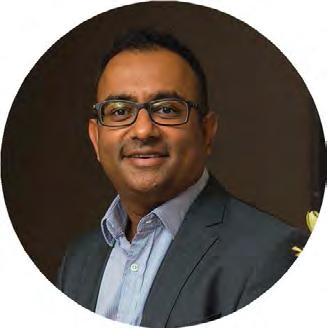
5 minute read
Progress for surgery in the Northern Territory
There’s plenty of positive change in sight for surgery in the Northern Territory (NT). The remote territory has been working hard to gain much-needed acknowledgement and advocacy for its distinctive needs, which will hopefully improve long-standing health inequities compared to other areas of Australia. Dr Hemi Patel is leading the charge. Dr Patel is an Ear, Nose and Throat (ENT) surgeon based in the NT. He’s head of department at Royal Darwin Hospital and has his own private practice, Darwin ENT. He’s also chair of the Northern Territory Medical Board and chair of the Northern Territory Committee for the Royal Australasian College of Surgeons (RACS). Dr Patel trained in the UK before moving his family to Darwin, in 2007, to learn more about the challenging ear disease that’s unique to the NT. He admits he had only planned to come to Australia for one year. “But within a month, we fell in love with the laid-back, tropical lifestyle. There’s an unending supply of interesting work here and you feel like you can make a difference.”
Dr Patel says he probably chose ENT as a specialty because of a positive internship under the wing of two ENT mentors, who were very supportive and let him experience interesting work. He also likes the variety. “As a rural ENT, you see people of all ages. You can do microscopic, endoscopic or major open head and neck surgery. It’s a unique specialty, which can cover anyone’s potential interests.” In the UK, as a metropolitan surgeon, he was heading down a very defined subspecialty path. “In the Territory, I have much more of a generalist hat on. I enjoy the challenge of having to be multiskilled and ready for any case that comes through the door.” Dr Patel is a strong advocate for surgery in the NT. The most pressing health issue, he says, is closing the gap. “Indigenous Australians have worse health outcomes across the spectrum of diseases. Health literacy is low and there are the usual social determinants for health—poor sanitation, overcrowding, maternal smoking, poor nutrition, alcohol abuse, and lack of access to healthcare. There are also language barriers and the remoteness of communities to consider.” Thirty per cent of people in the NT are Indigenous Australians. Dr Patel is part of an outreach program. He and his team spend close to half the year in rural communities and estimates that up to 60 per cent of his patients are Indigenous. He says RACS can best support the NT by providing ongoing recognition and advocacy. “The College is already exploring ways to support initiatives to redistribute the surgical workforce and surgical care where it’s needed in regional and remote areas, potentially through training models. RACS also needs to keep talking to Indigenous Australians, to understand what they want and how they want to do it.”
Advertisement

In a very positive step forward, RACS has recently approved the establishment of its first office in Darwin, which means better administrative support for the NT Committee and their role in the Territory. It also means NT will be more present and included in College business and activities.
Dr Patel is excited about a recently proposed model to reverse the hub and spoke model of surgical training in regional areas. Currently, Trainees are primarily based in big city hubs, spending only six to 12 months in regional centres. Soon, recruitment will also happen in regional centres so that most of the training can be completed there, as a regional hub. Trainees will then be going to metropolitan centres as needed for their training, while retaining the NT as their base. The details and design of this model still has to be finalised. “If implemented, that will be a fundamental shift in surgical training models,” said Dr Patel. “If we can recruit from regional medical schools, get people interested in surgery locally, and train them in regional centres during their formative years, they’ll be more likely to build a life and stay there.” In a landmark move, in April 2022, RACS executed a Memorandum of Understanding (MoU) with the NT Health to achieve four mutual goals: • improve local pathways for surgical training • train Indigenous surgeons • improve Indigenous health outcomes • improve retention of NT’s surgical workforce.
“Currently, we only have about 25 Fellows in the NT, so until now, our lobbying power for advocacy and action has been very limited. This MoU between RACS and NT Health is an important pillar by which to talk, collaborate and take action.”
For Dr Patel, the most exciting aspect of the MoU is the prospect of recruiting and retaining more local talent. “Locally trained surgeons will be more likely to stay in the region for the span of their careers. Local surgeons also mean we have more culturally safe practices, as we understand the local context in how we deliver care. We have different patients, resources, and infrastructure to other places.” In another recent development, Dr Patel says the Australian Society of Plastic Surgeons (ASPS) visiting plastic surgery service model has been very beneficial for NT patients and local surgeons. “In future, we could potentially run similar visiting surgical models long-term to have sustainable services in the Territory, supporting local surgeons serving the local community.” Dr Patel and his team are involved in a ground-breaking project (Drumbeat. ai) that could change the future of ear disease diagnosis in rural and remote areas. They are working with Microsoft and several Australian universities to develop an AI model for diagnosing ear conditions from images of ear drums and hearing tests. Their work is not only pivotal for equitable access to ear healthcare, it shines a light on the NT health and research. Dr Patel has many hopes for NT’s future. He wants to see the gap close for Territorians, with easier access to suitable healthcare. NT urgently needs more local nurses, GPs and surgeons, and more funding invested in primary prevention and care. “We need access to robotic surgery, lasers and other technologies that are now at the forefront of the profession. The next generation of young surgeons are going to demand it,” he said. “Surgeons can be benevolent and altruistic and want to make a difference, but if we want to attract bright, talented young people to stay in regional areas for their whole careers, we must be able to offer them professional satisfaction.” Dr Patel has a message for surgeons contemplating a career in regional and rural surgery: “Get on the next plane. You are much needed in the Territory. The opportunities in regional centres are exciting and you have a higher degree of autonomy. You don’t necessarily have to choose a subspecialty; you can practise as a generalist in your chosen specialty in a regional centre and have a rewarding career with good work-life balance.”
Image: Dr Hemi Patel










